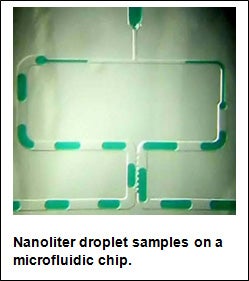
Analytical Chemistry
We constantly seek to push the boundaries of sensitivity, throughput, and resolution in chemical analysis. We are inspired by the challenges of better understanding diabetes, neuroscience, and drug discovery.

Lab on a Chip. Microfluidics has become a prominent tool for our work. It is possible use microfabrication techniques to build microfluidic chips that consist of networks of channels of micrometer depth and width in substrates of glass (or plastic). Proper arrangement of the channels allows samples to flow through the device for separation and analysis. This integration of function allows development of “analytical processors” (analogous to microprocessors in electronics) or “Lab on a Chip” that perform complex tasks even on picoliter to nanoliter samples. An emerging trend in this work is to manipulate samples as small droplets bound by immiscible fluids. Such droplets are like nanoliter “test-tubes” and allow high-throughput, complex manipulations. We are interested in designing analytical processors for chemical analysis. Examples include chips that remove samples from the brain, derivatize them, and then separate the components at 5 s intervals for in vivo chemical monitoring (see below) and a microfluidic system that performs chemical reactions on nanoliter scale and then analyzes the products by mass spectrometry.


Separations and Mass Spectrometry. Chromatography and electrophoresis are required for many analytical measurements of complex mixtures such as cell extracts, bodily fluids, or synthetic reactions. While powerful methods, they are generally time consuming and become the rate-limiting step of analysis. Further, the time scale of separations limits their application. We have been interested in speeding up the separation process. A key way of achieving this is miniaturization, e.g. on microfluidic devices or in small capillaries. In electrophoresis, the small dimensions allow application of high voltages for separations in less than 1 s. In chromatography, reduced scale can decrease band broadening allowing the separation to be sped up. The small scale also enables nanoscale samples to be analyzed. By using microfluidics such high speed can be performed in parallel for high-throughput analysis. Developing interfaces of such methods to mass spectrometry allows for methods that allow separation and identification of hundreds of compounds in complex mixtures.




You must be logged in to post a comment.